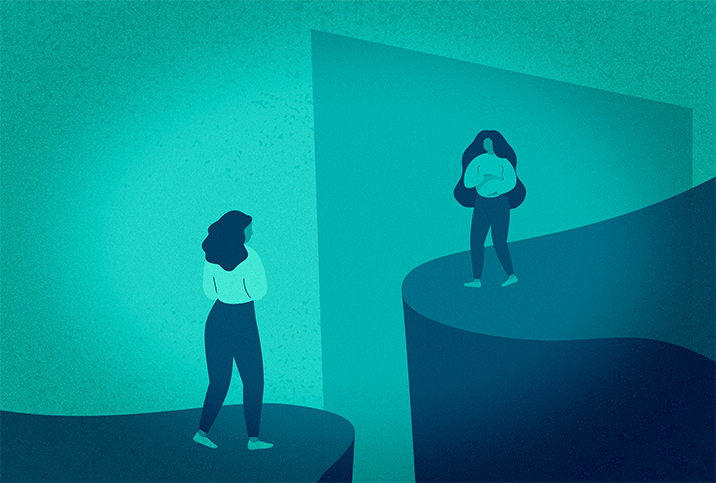Hypnosis May Help Your Fertility Journey

Robyn Crane, a mother of two in Tampa, Florida, had a long and emotional fertility journey before welcoming her first child a couple of months prior to her 40th birthday. After five years of trying—nine intrauterine inseminations (IUIs) and three in vitro fertilization (IVF) retrievals later—her son was born in 2018.
When he was 17 months old, Crane and her husband decided they wanted to have another baby and prepared for another potential "uphill battle" ahead. But they believed it would happen for them, and that maybe they could "even manifest a baby."
"We were determined to get pregnant again and open to going through fertility treatments again—if we needed to," she recounted.
"We started the process of meeting with a fertility doctor. I also was paying attention to my health: going to the chiropractor, eating healthier, acupuncture, even praying," Crane said, adding that all these "hacks" didn't help without a bunch of fertility treatments the first time around.
Additionally, this time, Crane started listening to a hypnosis series for fertility. She attributed her success of conceiving within two months of trying—most importantly, without any fertility intervention—to the recordings.
In 2020, she gave birth to a baby girl.
The psychological impact of infertility
In the United States, about 1 in 5 (19 percent) heterosexual women ages 15 to 49 with no prior births are unable to conceive after one year of trying, according to the Centers for Disease Control and Prevention (CDC). Infertility after one or more births, called secondary infertility, is less common, affecting only 6 percent of married women in the same age range.
The stress of being unable to conceive makes some infertility patients pursue treatments and procedures aggressively, while others withdraw and isolate themselves from friends and family, according to the American Society for Reproductive Medicine (ASRM). These extremes are not healthy, and reducing stress can improve the quality of life.
Being a parent is an important desire for some people and provides a sense of identity, according to Elena Touroni, Psych.D., a consultant psychologist, founder and clinical director of the Chelsea Psychology Clinic in London. Facing fertility struggles can cause a lot of anxiety and stress.
"There might be strong feelings of loss as each period can serve as a trigger and reminder of your difficulties conceiving," she said. "There can also be a sense of losing control. Many people don't expect to have difficulties getting pregnant until they are living this experience themselves."
Touroni described infertility as "an incredibly destabilizing psychological experience" which can take many years to reconcile.
The link between stress and infertility
Hypnotherapist and author Grace Smith, the creator of the Grace app fertility series Crane used, had experienced reproductive issues for months herself before getting trained in fertility hypnosis. When counting back from her due date, she realized her baby was conceived the day she first saw her husband after the training.
"In my case, it was very much stress-related. And once I was able to visualize becoming pregnant, easily and effortlessly in a happy state, that's what I needed," said Smith, who is based in Vero Beach, Florida. "Other women need other things. And some women truly go through hell and back in order to have a baby."
Though scientists aren't sure what percentage of infertility is caused by stress, Smith was taught during her fertility hypnosis training that up to 80 percent of all infertility is stress-based. For many struggling women, advice like "You just need to relax," "It's all in your head" and "Stop overthinking" is infuriating and defeating.
Having worked with thousands of clients, Smith has noticed other major contributors to blocking pregnancy, such as subconscious fears about birth, motherhood and worthiness, which further increase stress levels.
"Decreasing stress is not straightforward at the conscious level of the mind, and 'just relax' is not at all easy to do when one's hopes and dreams are being dashed after expensive, emotional, painful procedures and when it seems like everyone is posting happy pregnancy announcements on social media on a daily basis," Smith said.
How can hypnosis help with infertility?
Hypnosis can control cortisol, our stress hormone, explained Tara Scott, M.D., an OB-GYN in Akron, Ohio.
"High cortisol can inhibit the release of hormones from the pituitary, and these hormones are instrumental in controlling ovulation. For the woman whose fertility is affected/impaired by stress, this could be a great noninvasive option," she said.
Even for women whose infertility is not stress-based, Smith suggested that accessing the deeply relaxed state of hypnosis is still tremendously beneficial and healing, even if it does not lead to pregnancy.
"It's wonderfully cathartic for the mind and body to experience the peaceful rest that is only accessible at the theta brain wave state," Smith said.
If you're struggling with infertility, you're not alone. Speaking to your OB-GYN or a reproductive endocrinologist is an important first step in your journey. They can offer guidance and resources tailored to your specific needs and situation.


















